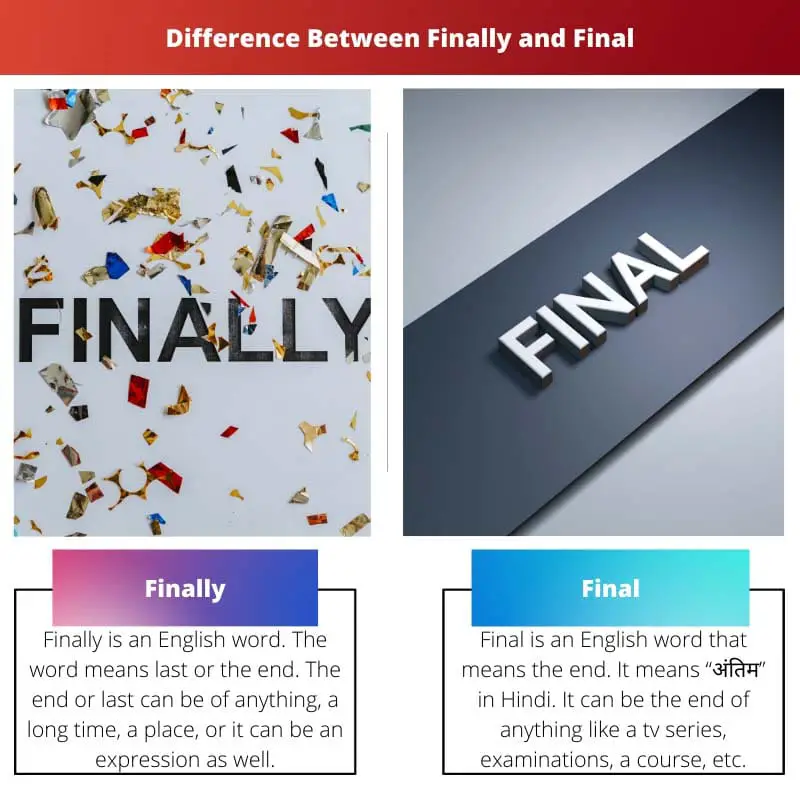Finally, the Final are two words of English grammar. The words mean the same, but they are used in very different sentences as their meanings change according to the grammar, tenses, direction of speech, and types of voice.
Key Takeaways
- “Final” is an adjective indicating the last in a series or the end of something, while “finally” is an adverb expressing the conclusion of a process or event.
- “Final” can describe a noun, like a final decision, whereas “finally” modifies a verb or clause. For instance, “They finally arrived.”
- Both “final” and “finally” can indicate a sense of completion or closure, but they serve different grammatical functions.
Finally vs Final
Finally is an English grammar word used to indicate achieving or getting something after a long time of effort or waiting. Finally is used as an adverb, for example, finally, I got my degree. Final refers to the end of something. Final is used as an adjective like the final term has just started.

Finally, it means end or last. In hindi it means “अंत में. Finally is an adverb, a word that modifies the verb in a sentence.
The word “finally” can represent the end of a series of events, the end of a long time, or the introduction of a final point.
Final is an adjective. An adjective modifies the noun in the sentence.
The word represents the end of anything, anytime, or any place.
Comparison Table
| Parameters of Comparison | Finally | Final |
|---|---|---|
| Meaning | Finally, mean last or end. | Final also means last or end. |
| What Is It? | Finally is an adverb. | Final is an adjective. |
| Modifies | It modifies the verb in a sentence. | It modifies a noun in a sentence. |
| Used to | Used to represent a long time usually. | Used to represent the end. |
| Example | For example, ” He finally realized Ryan was serious.” | For Example, “This is my Final Decision.” |
What is Finally?
Finally, it is an English word. The word means last or the end. The end or last can be of anything: a long time, a place, or it can be an expression as well.
Finally is an adverb, a word used to modify a verb in the sentence. It can modify another adverb, determiner, clause, preposition, or sentence as well.
Examples: A. 1. Three hours later, the bus finally arrived.
2. I’m so happy to finally meet you.
In this example, the end of the period of time is mentioned.
B. 1. Finally, I would like to thank my supporters…
2. Well, I finally settled for a musician as a career because…
This sentence shows the conclusion. The last point is shown by the word.
C. 1. After many attempts, they finally gave up.
2. Finally, the last season is here.
A final attempt as a final event, the last occurrence, is shown.
D. 1. The only thing that matters is that you are finally healthy and fit again.
2. Finally, my prayers have been heard.
Here, the word shows an ultimate possibility, an expression.

What is Final?
Final is an English word that means the end. It means “अंतिम” in Hindi.
Finally, is an adjective.
Examples:
1. Is this your final decision?
2. This is the final act of the show.
In these sentences, the word Final represents an end, a last point of time, or of manner. It can represent the end of anything and can give the answers to what, when, where, how, etc.

Main Differences Between Finally And Final
- Finally, it is used to modify a verb in the sentence, while Final is used to modify a noun or a noun phrase.
- The example of Finally, ” He finally realized Ryan was serious.”. The example for final, “This is my final decision, that’s it.”


This is the final comment, let’s move on
Agreed
Definitely let’s!
This article really dived into the core of the differences, it was very helpful!
Yes, indeed!
Very detailed article, I enjoyed reading it!
The post felt very repetitive and boring
Well I found it very captivating
I think it was quite informative
I found the article to be very dry and lacking in real substance, the content seemed repetitive
I don’t fully agree, I think the post had some good takeaways
I also think the explanation could have been deeper
Finally, I have a full understanding of the differences, great article
Yes, very well written
This was a really informative article, I had never realized the subtle differences between finally and final, the examples were very illustrative
Indeed, the article was very educational
I agree, this was very enlightening
The content could have been more dynamic, it was quite flat
I understand your point but I found it a solid read
A great effort on the part of the writer